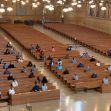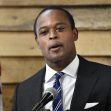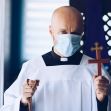Known for relatively stringent pandemic safety measures (along with protests and governor-kidnapping plots in response), Michigan remains in a partial shutdown amid the ongoing COVID-19 crisis. Though the state of the pandemic now surpasses the initial early-spring surges, restrictions are far less universally imposing than the lockdowns enacted at the virus’s onset.
Nonetheless, entertainment venues in Michigan are shuttered, and indoor bars and dining are off-limits, with limited outdoor capacity allowed for any braving the northern chill. High schools and colleges, both recognized as bearing a statistically higher transmission risk than younger student populations, are prohibited from holding in-person classes.
The order extends to both public and non-public schools. Yet, one group among the non-public set calls the closings discriminatory and unconstitutional—and the United States Department of Justice (DOJ) has just officially backed their fight.
On Dec. 11, the Justice Department released a statement of interest to voice its support for a group of Catholic high schools suing the state for its emergency health directives.
The Michigan Association of Non-Public Schools (MANS) claimed First Amendment violations in their motion for a temporary restraining order and preliminary injunction against the state-mandated closings, with the DOJ now urging the district court to consider the order’s implications against religious freedom.
“This case raises issues of national public importance regarding the interplay between the government’s compelling interest in protecting public health and safety from COVID-19 and citizens’ fundamental right to the free exercise of religion,” the statement of interest said.
The DOJ proposed that the U.S. Constitution requires Michigan to provide a distinct motive for allowing certain educational instruction to continue in person without including religious instruction in the same indemnities.
The Michigan Department of Health and Human Services (MDHHS) originally issued the closing order on Nov. 18 and set it to expire on Dec. 8. However, with coronavirus numbers still trending ominously, on Dec. 7, Gov. Gretchen Whitmer announced the MDHHS’s decision to extend the order through Dec. 20 to allow state health officials to “determine the full impact of the Thanksgiving holiday on the spread of Covid-19 across Michigan.” According to state law, the MDHHS has the authority to “prohibit the gathering of people” during an epidemic health emergency.
Group exercise classes, movie theaters, casinos, and indoor dining are to remain shut down, along with high schools, colleges, and universities being prohibited from in-person classes. According to a press release, professional and college sports may continue without fans and only if they meet “extraordinary standards for risk mitigation”—which can include “at least” six COVID-19 tests a week for each participant, with time factored in to confirm the negative results before the team can meet again. The guidance stipulates contact sports like wrestling and football should remain off-limits until COVID-19 transmission rates decline.
The athletic “exemption” to the closing order is among the MANS complaints of discriminatory government action. Other exceptions include boarding schools that don’t allow students on and off-campus (“closed-campus”), childcare and special education services, and trade and technical school learning—the latter of which was ordered to allow in-person instruction “only to the extent that (the) activities cannot be performed remotely.” All exceptions apply uniformly to public and non-public schools, including religious educational institutions.
Also exempt from closure (and utterly immune to restrictions, per the order): any “place of religious worship.” Therefore, students of the three Catholic schools included in the lawsuit who are restricted to remote learning will not face restrictions to the majority of faith practices, though MANS Executive Director Brian Broderick suggests otherwise.
“While faith is integrated into curriculum, physical presence at a faith-based school allows for additional, unique integration beyond classroom instruction,” he said. “This includes religious services, participation in the sacraments and the overall Christian community.”
The DOJ statement, too, insists “physical presence (is) necessary for effective religious education, including daily Mass and physical receipt of the Eucharist, regular Eucharistic adoration, in-person administration of the Sacrament of Reconciliation, and communal prayer throughout the school day.”
The Eucharist sacrament, which the Vatican calls “the source and summit of Christian life,” is inherently part of the Catholic Mass, therefore administered only in places of worship. Reconciliation is performed by a priest at any “reasonable” time, most often also in a Church setting. The MDHHS implements no limits whatsoever on such gatherings.
Despite all high schools being subject to the same closing procedures and the evident ability to continue the practice of each aforementioned religious exercise, the DOJ and MANS assert that these reasons are enough for the health department to offer Catholic schools additional exceptions beyond those afforded to non-religious high school establishments (specifically, non-Catholic schools). Indeed, they demand justification for not being entirely exempt from closure solely on a religious basis.
The Justice Department focused on the apparent injustice inflicted upon these Catholic high schools. “These noble patriots did not fight and die to protect the nonexistent authority of government to discriminate against the exercise of religion by people of faith,” the DOJ said. “Discrimination against the right of the people to practice their religion violates everything this country stands for.”
Importantly, the state’s order does not display preferential treatment one way or another to religious educational institutions—high schools, whether Catholic or public, are classified together as identical risk factors. In other words, the MDHHS has made no distinction to indicate religious high schools are safer than non-religious high schools. They simply regarded the data and issued orders to mitigate the spread of COVID-19.
Local health departments report educational institution “outbreaks”—defined as two or more COVID-19 cases from different households that in some way shared space to originate in school–on a weekly basis to the MDHHS. The week of the order’s extension, the MDHHS noted the state’s case rate was five times what it had been at the start of October and reported a test positivity rate of 14 percent—Michigan’s testing had increased by 78 percent during this time, but cases surged by 225 percent.
Another Catholic school, St. Michael Academy, filed a lawsuit separate from MANS on Dec. 14, making similar claims of religious freedom violation and adding that “science” is on the school’s side.
“The science says harm caused by children being kept away from schools is far greater than the chance of that child ever coming down with COVID-19,” according to St. Michael’s attorney, Richard Thompson. It is unclear what, if any, data he is referring to.
The area in which St. Michael’s is located is currently seeing around 75 percent occupancy of ICU beds. “Capacity is still a statewide issue that we are very much concerned about,” said John Karasinski, communications director for the Michigan Health and Hospital Association.
Overall, 96 distinct COVID-19 outbreaks have been traced directly back to Michigan high schools.
The DOJ statement cites several cases in relation to their argument, including the recent high-profile case Roman Catholic Diocese of Brooklyn v. Cuomo, on which the U.S. Supreme Court ruled in favor of the churches based on the free exercise clause. The state’s legal representation rejects such a parallel.
“Regarding their First Amendment claim, the director’s order does not violate the free exercise clause because it is neutral and generally applicable,” according to the Attorney General’s Office representing the MDHHS. “Indeed, the order neither interferes with the practice of religious organizations nor targets religion in any way.”
The DOJ also references another 2020 Supreme Court case to elicit consideration of the exemptions: Espinoza v. Montana Dept. of Revenue. The High Court there determined the state could not legally distinguish religious schools from other schools when directing state-sponsored funding. However, this very ruling seems to disqualify the MANS position.
“Once a state decides to , it cannot disqualify some private schools solely because they are religious,” Chief Justice John Roberts wrote in the majority opinion.
It would seem the Supreme Court finds distinguishing private schools from one another on a religious basis is unconstitutional, a violation of the Fourteenth Amendment’s Equal Protection Clause. Perhaps the same logic should apply in Michigan.






